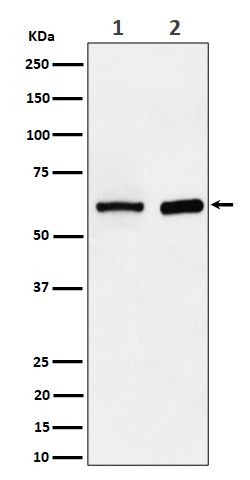
| WB | 咨询技术 | Human,Mouse,Rat |
| IF | 咨询技术 | Human,Mouse,Rat |
| IHC | 1/100-1/200 | Human,Mouse,Rat |
| ICC | 技术咨询 | Human,Mouse,Rat |
| FCM | 咨询技术 | Human,Mouse,Rat |
| Elisa | 咨询技术 | Human,Mouse,Rat |
| Aliases | Arginyltransferase 1; Ate1; R transferase 1;;Arginyltransferase 1 |
| WB Predicted band size | 59 kDa |
| Host/Isotype | Rabbit IgG |
| Antibody Type | Primary antibody |
| Storage | Store at 4°C short term. Aliquot and store at -20°C long term. Avoid freeze/thaw cycles. |
| Species Reactivity | Human,Mouse,Rat |
| Immunogen | A synthesized peptide derived from human Arginyltransferase 1 |
| Formulation | Purified antibody in PBS with 0.05% sodium azide,0.05% BSA and 50% glycerol. |
+ +
以下是关于ATE1抗体的3篇参考文献及其摘要概括:
1. **文献名称**:Arginyltransferase ATE1 is a regulator of RGS protein stability in vivo
**作者**:Kwon YT et al.
**摘要**:该研究利用ATE1抗体检测基因敲除小鼠模型,发现ATE1通过精氨酸化修饰调控RGS蛋白稳定性,影响G蛋白信号通路,揭示其在细胞信号调控中的作用机制。
2. **文献名称**:Absence of post-translational arginylation results in cardiovascular developmental defects
**作者**:Kwon YT et al.
**摘要**:通过ATE1抗体分析发现,ATE1缺失导致小鼠胚胎心脏发育异常,证明其介导的精氨酸化修饰对心肌细胞分化和心血管系统形成至关重要。
3. **文献名称**:ATE1 regulates the degradation of HIF-1α through arginylation-dependent proteolysis
**作者**:Lee MJ et al.
**摘要**:研究利用ATE1抗体进行免疫沉淀实验,证实ATE1通过精氨酸化标记HIF-1α,促进其泛素-蛋白酶体降解,进而影响肿瘤细胞对缺氧微环境的适应性。
ATE1 antibody is a research tool used to detect and study the function of Arginyltransferase 1 (ATE1), an enzyme critical for post-translational protein modification. ATE1 catalyzes the conjugation of arginine to the N-terminal aspartate or glutamate of proteins, a process central to the N-end rule pathway, which regulates protein stability, localization, and activity in eukaryotes. This pathway influences diverse cellular processes, including stress responses, apoptosis, and cardiovascular development.
ATE1 antibodies are widely employed in techniques such as Western blotting, immunohistochemistry, and immunofluorescence to investigate ATE1 expression and distribution in tissues or cultured cells. Research using these antibodies has revealed ATE1's role in modulating cytoskeletal dynamics, cell migration, and angiogenesis. Dysregulation of ATE1 is implicated in pathological conditions like cancer metastasis, cardiovascular diseases, and neurodegenerative disorders. For example, ATE1 knockout studies in mice demonstrate embryonic lethality due to impaired vascular development, underscoring its physiological importance.
ATE1 antibodies are often species-specific, targeting conserved epitopes across human, mouse, or rat homologs. Their application aids in exploring the enzyme's interaction networks and substrate specificity, contributing to drug discovery efforts targeting protein quality control mechanisms. As ATE1's regulatory functions continue to emerge, these antibodies remain vital for deciphering its multifaceted roles in cellular homeostasis and disease.
×